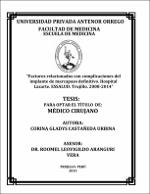Mostrar el registro sencillo del ítem
Factores relacionados con complicaciones del implante de marcapaso definitivo. hospital lazarte. ESSALUD. Trujillo. 2008 - 2014
| dc.contributor.advisor | Aranguri Vera, Roomel Leovigildo | |
| dc.contributor.author | Castañeda Urbina, Corina Gladys | |
| dc.creator | Castañeda Urbina, Corina Gladys | |
| dc.date.accessioned | 2016-08-02T15:14:12Z | |
| dc.date.available | 2016-08-02T15:14:12Z | |
| dc.date.issued | 2015 | |
| dc.identifier.uri | https://hdl.handle.net/20.500.12759/1721 | |
| dc.description.abstract | Determinar si el uso de anticoagulantes, el tipo de marcapaso, la falta de profilaxis antibiótica y la insuficiencia cardiaca constituyen factores de riesgo relacionados con complicaciones del implante de marcapaso definitivo en pacientes atendidos en el Servicio de Cardiología del Hospital Víctor Lazarte Echegaray ESSALUD – Trujillo en el periodo de estudio Enero 2008 – Diciembre 2014. MATERIAL Y MÉTODO: Se realizó un estudio observacional, analítico, retrospectivo, de casos y controles, que evaluó 140 pacientes > 18 años, con implante de marcapaso definitivo, considerando que 28 de ellos fueron el grupo de casos y los otros 112 fueron el grupo de los controles, que fueron atendidos en el Servicio de Cardiología del Hospital Víctor Lazarte Echegaray, durante el periodo Enero 2008 a Diciembre 2014. RESULTADOS: En nuestra muestra (140 pacientes), un 20% (28 pacientes) presentan complicaciones. Se encuentra que el 28.6 % de los pacientes con marcapaso definitivo que desarrollan complicaciones usan anticoagulantes al igual que en el 17 % de los pacientes sin complicaciones, siendo factor de riesgo asociado para la presencia de complicaciones (OR: 1.9). El 14.3% y 8.9 de los pacientes con y sin complicaciones respectivamente utilizan marcapaso tipo bicameral, siendo también factor de riesgo asociado (OR: 1.7). El 75% de los pacientes con complicaciones presentan falta de profilaxis antibiótica en comparación del 32.1% de aquellos sin complicaciones, condicionando un fuerte grado de asociación con la ocurrencia de complicaciones (OR=6.3). El 82.1% de los pacientes complicados presentan insuficiencia cardiaca al igual del 29.5% de aquellos no complicados, siendo factor de riesgo con muy fuerte grado de asociación con la ocurrencia de complicaciones (OR=11.1). CONCLUSIONES: La falta de profilaxis antibiótica se asocia fuertemente con la ocurrencia de complicaciones del implante de marcapaso definitivo (OR= 6.3) mientras que la insuficiencia cardiaca se asocia muy fuertemente a la ocurrencia de complicaciones (OR= 11.1). El uso de anticoagulantes (OR= 1.9) y el tipo de marcapaso (OR=1.7) también muestran de moderada - leve asociación con la aparición de complicaciones. | es_PE |
| dc.description.abstract | To determine if the use of anticoagulants , the type of pacemaker, the lack of antibiotic prophylaxis and the chronic heart failure are risk factors associated with complications of permanent pacemaker implantation in patients treated in the Cardiology Department of Victor Lazarte Echegaray Hospital - ESSALUD in Trujillo, during the period from January 2008 to December 2014 . MATERIAL AND METHODS: We conducted an observational, analytical, retrospective, case-control study, which evaluated 140 patients above 18 years, with permanent pacemaker implantation, while 28 of them were the case group and the other 112 were the control group, who were treated at the Department of Cardiology Victor Lazarte Echegaray Hospital during the period from January 2008 to December 2014. RESULTS: We take within the universe of patients (140 patients), 20% (28 patients) have complications. We find that 28.6% of patients with permanent pacemaker who develop complications like anticoagulant use in 17% of patients without complications, being a risk factor associated to the presence of complications (OR: 1.9). 14.3 and 8.9% of patients with and without complications respectively pacemaker use bicameral type, also being found as a risk factor (OR: 1.7). 75% of patients with complications present absence of antibiotic prophylaxis versus 32.1% of those without complications, conditioning a strong degree of association with the occurrence of complications (OR = 6.3). 82.1% of patients have heart failure complicated as 29.5% of those uncomplicated, appearing as a risk factor with strong degree of association with the occurrence of complications (OR = 11.1). 4 CONCLUSIONS: Lack of antibiotic prophylaxis is strongly associated with the occurrence of complications of permanent pacemaker implantation (OR = 6.3) while heart failure is associate strongly with the occurrence of complications (OR = 11.1). The use of anticoagulants (OR = 1.9) and the type of pacemaker (OR = 1.7) also show moderate - low association with the occurrence of complications. | en_US |
| dc.description.uri | Tesis | es_PE |
| dc.format | application/pdf | es_PE |
| dc.language.iso | spa | es_PE |
| dc.publisher | Universidad Privada Antenor Orrego - UPAO | es_PE |
| dc.rights | info:eu-repo/semantics/openAccess | es_PE |
| dc.source | Universidad Privada Antenor Orrego | es_PE |
| dc.source | Repositorio institucional - UPAO | es_PE |
| dc.subject | Marcapaso definitivo | es_PE |
| dc.subject | Factor de riesgo | es_PE |
| dc.title | Factores relacionados con complicaciones del implante de marcapaso definitivo. hospital lazarte. ESSALUD. Trujillo. 2008 - 2014 | es_PE |
| dc.type | info:eu-repo/semantics/bachelorThesis | es_PE |
| thesis.degree.level | Título Profesional | es_PE |
| thesis.degree.grantor | Universidad Privada Antenor Orrego. Facultad de Medicina Humana | es_PE |
| thesis.degree.name | Médico Cirujano | es_PE |
| thesis.degree.discipline | Medicina | es_PE |
Ficheros en el ítem
Este ítem aparece en la(s) siguiente(s) colección(es)
-
Medicina Humana [2739]

